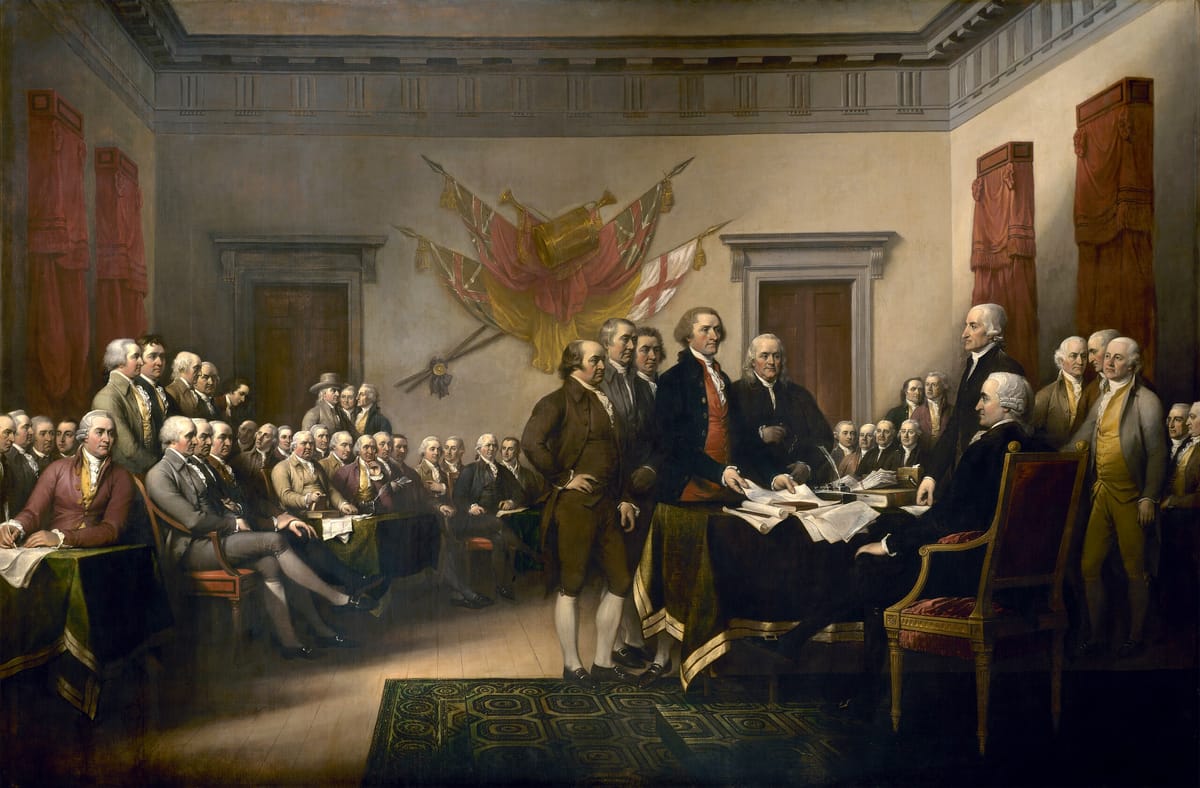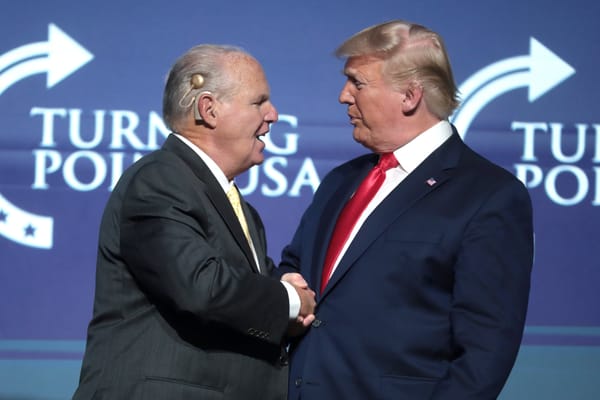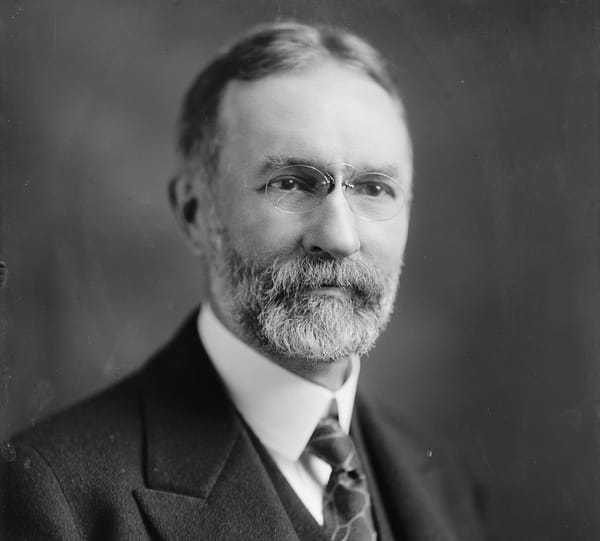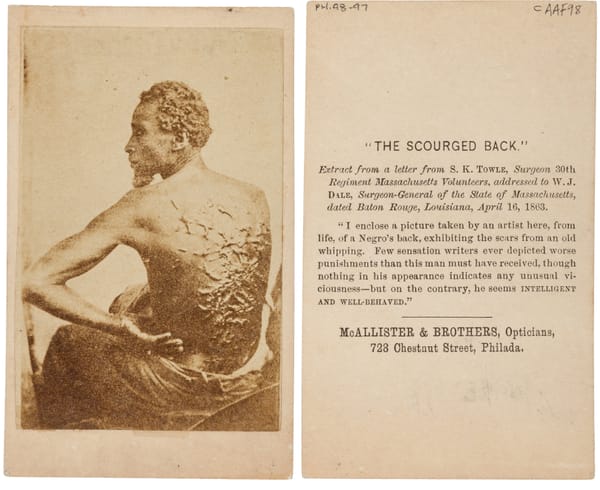The Fixed Theme of American History
The history of America is a long struggle between the drive for domination and the dream of freedom.

America is an idea. In the hands of cosmopolitans, this worn-out cliché explains the American government’s unique calling to both promote and live up to such high ideals as freedom, democracy, and progress. To others, this idealist conception of the U.S. spells trouble. It is what inevitably draws the country into costly wars and exposes the nation’s workers to economic insecurity. Steve Bannon explains1:
That's liberalism. That’s a set of ideas—dangerous ones—put forward by people from around the world…the ones blowing trillions of dollars trying to impose democracy on places that don’t want it…the ones trying to create a world without borders.
It is not for nothing that many on the far-right reject this disembodied view of the United States. For far-right nationalists like Bannon, the United States is first and foremost a nation. A country with a uniquely textured history, peculiar institutions, concrete borders, and a distinct people. "It’s the f—in’ Pilgrims and the Puritans," the so-called ‘real backbone’ of America.2 During his acceptance speech at the 2024 Republican National Convention, Vice President J.D. Vance, used his solemn platform to remind the world that America is a ‘nation,’ not ‘just an idea’:
You know, one of the things that you hear people say sometimes is that America is an idea (…) But America is not just an idea. It is a group of people with a shared history and a common future. It is, in short, a nation.
Here again the familiar vision of America as a ‘creedal nation’ is downplayed to make way for the Trump team’s decade-long effort to etch in American minds a strong mental and physical demarcation between ‘them’ and ‘us’.3
And yet, even self-fashioned realists who despise the all too common tendency to reduce a country as historically well-defined as the United States to a set of ideas are often more than happy to appeal to those very same ideas when formulating their own theories of the spectacular rise and enduring success of the United States. To give you a sense of this remarkable achievement, consider the fact that in 1990 America accounted for about 40% of the overall GDP of the G7 group. Today, the U.S. accounts for at least half of the total GDP of this exclusive list of advanced countries. In 2008, the U.S. and Eurozone economies were on par. Today, the U.S. economy is twice the size of Europe. In 2010, the American economy was roughly 10% larger than the combined economies of the so-called ‘global south’ (Latin America, Africa, East/South Asia, and the Middle East). Today, the U.S. economy is 30% larger.
Having to explain the U.S’s unparalleled growth over the span of a few decades, Steve Bannon ultimately settled on the following explanation:
I ask people, I say, ‘Why is the United States so wealthy?’ ‘Oh, you’ve got the most robust capital markets, everybody wants to put their money here, they want to invest,’ I go, ‘Why is that?’ ‘Well, you know, because it’s so liquid and guys can come and make money and put money in,’ and I say, ‘But why is it liquid?’ And they go, ‘Well, because people have put so much money in it.’ I go, ‘No, there’s a reason why they put so much money in it.’And they go, ‘Why, because they get better returns?’ and I go ‘What is that based on?’ And it finally gets down—if you play Twenty Questions—to the safety and security of the American capital markets. And the safety and security of the American capital markets is based upon a social structure that is all the grundoons! It’s the firemen, the cops, the teachers, it’s a stable society. Right?4
So liberalism after all.
What Bannon here describes as a stable ‘social structure’ undergirded by the grunt work of those who keep society functioning properly is in fact a liberal system of government, erected on the basis of foundational liberal ideas, and kept afloat by public faith in the fundamental soundness of the system. The Nobel prize-winning M.I.T economist Daron Acemoglu and his University of Chicago colleague James A. Robinson have emphasized the importance of sound, rule-based institutions that allow citizens to rationally organize their lives and exercise their talents to the fullest extent possible, without fear of being exploited by the state, as the foundation of enduring national prosperity.5
When roads are safe, bodies unmolested, and the rules of life—whether at the individual or collective level—are based on reasonable and agreed-upon principles which have the salutary effect of including rather than excluding people from enjoying the nation’s riches and ideals, even the people at the relative bottom of society have sufficient trust in the political system to keep grinding away, often in hopes of achieving their own dreams. To reprise a speech delivered in 2007 in Bettendorf, Iowa, by none other than then candidate Barack Obama, those cops, firefighters, and teachers, all "share a faith in simple dreams. A job with wages that can support a family. Health care that we can count on and afford. A retirement that is dignified and secure. Education and opportunity for our kids. Common hopes. American dreams."6
In The Sum of Our Dreams, a small but essential survey of American history by historian Louis Masur, readers are able to clearly see and appreciate the fact that American prosperity is not only the combined result of the dreams and aspirations of past Americans, but is also sustained by the exertions of those who still dare to dream of a better future for themselves and their communities. The collective dreams of the millions of people living in the U.S. are powered by the conviction that "every American has the right to pursue their dreams" and that their persons and property will remain safe in their pursuit of happiness. So long as America remains ‘the land of the free’ then, to quote basketball player Kevin Garnett, ‘everything is possible.’
While the American dream seems to regularly escape the grasp of those not born in favorable circumstances, no accident of birth is more fortuitous these days than to be born in present-day U.S.A. To be American is to enjoy a basic level of wealth and freedom unseen in other parts of the world. It explains why despite its reputation for xenophobia, the U.S. remains one of the best places in the world for immigrants to live and work. Acemoglu and Robinson point out, for example, that in Nogales, Arizona, the average household income is $30,000, whereas in Nogales, Sonora, the Mexican half of the city, families get by on the equivalent of roughly $10,000 per average household. That a mere fence can so drastically alter the life prospects of otherwise ethnically and culturally similar people speaks to the importance of solid institutions and liberal norms.7
Armed with the hard-earned constitutional protections of past civil rights struggles, modern Americans are able to buy more and do more than previous generations of Americans—a fact that cannot escape anyone who reads Masur’s mini-history of the United States. When the Sioux Indians of South Dakota sought to reconnect with the religion of their ancestors, the U.S. army mowed them down with a machine gun. No freedom of assembly or religion allowed. For Chief Black Elk, the 1890 massacre at Wounded Knee Creek, which left more than 200 mostly unarmed men, women, and children dead, symbolized the death of a dream: the dream of a revitalized native nation. As he lamented,8
I can see that something else died there in the bloody mud, and was buried in the blizzard. A people’s dream died there.
Faced with increasing surveillance and repression, Chief Joseph of the Nez Percé tribe pleaded with authorities to allow him and his people to partake in the American dream: "Let me be a free man…free to travel, free to stop, free to work, free to trade where I choose, free to choose my own teachers, free to follow the religion of my fathers, free to talk, think and act for myself—and I will obey every law or submit to the penalty."9 Throughout the modern and early modern period, many Americans offered a similar plea but were confronted with the stone cold wall of white prejudice and discrimination.
More often than not it was war, rather than the triumph of ideas whose time had come, that delivered the freedoms that oppressed groups had long fought for. Speaking of former slaves, Frederick Douglass once said, "let the black man get upon his person the brass letters, U.S., let him get an eagle on his button, and a musket on his shoulder and bullets in his pocket," and "there is no power on earth that can deny that he has earned the right to citizenship."10 The truth, however, is that it was not until African slaves were confiscated from slave owners, and treated as military contraband, that it made sense for the government to emancipate many of them for the strategic purpose of enrolling them in the Union army and using their labor in fortification works.
Still, the fact that the Civil War was a conduit to liberation was not forgotten by subsequent generations of African-Americans, including W.E.B. Du Bois, who used his position at the National Association for the Advancement of Colored People to encourage blacks to support President Woodrow Wilson’s war in Europe. It would not be until the Cold War, with the eyes of the world watching to see if the U.S. had the moral record to justify the title of ‘leader of the free world’, that African Americans would see meaningful effort by the government to erase the noxious legacy of slavery and Jim Crow. Commenting on the passage of the signature civil rights acts of the post-war era, Masur notes that "as long as whites and blacks were legally segregated, the United States’ claims to democracy rang hollow, and communist nations reveled in the hypocrisy. Not any longer."11
This "dream yet unfulfilled," as Martin Luther King Jr. put it, of "a land where men of all races, colors, and creeds live together as brothers" would not seem real until the new millennium, when almost 70 million Americans would elect a visibly ‘colored’ politician as president of the United States.12 Much of this history can—and often does—leave a person with a cynical outlook on the nation’s history and character, but that is only if one chooses to ignore the myriads of ways in which Americans of all stripes struggled throughout the country’s difficult history to make this a ‘more perfect union.’
For all his faults (and there were many), Thomas Jefferson’s fateful decision to include the words "all men are created equal" helped transform the U.S. into a nation committed in theory, but seldom in practice, to the equal treatment of others. Thanks to his intervention, the nation’s greatest men, among them Henry Clay, Daniel Webster, Abraham Lincoln, and even the brilliant heretic, John C. Calhoun, were all forced to contend with those egalitarian words, and found them impossible to ignore.
The scale of the Jeffersonian achievement is most apparent when one considers the fact that unlike other nations similarly plagued by racist hatred, the United States had as part of its founding documents an explicit tribute to the natural equality of men, which served at various points in the nation’s tense history to counterbalance the reactionary forces within society, and shorten the lifetime of oppressive laws.
Abolitionists repeatedly pointed to the ‘spirit of liberty’ emanating from the Declaration as evidence that the Founders crafted the Constitution with every intention to establish freedom as a national principle and slavery as a strictly local institution, which in due time would naturally go extinct.13 To defend this vision of a free America, leading humanitarians such as Salmon P. Chase often quoted Thomas Jefferson and other founding fathers, insisting that "their creed is our creed…their faith, our faith."14 Under the influence of Salmon P. Chase, Charles Sumner, and Abraham Lincoln, the Republican Party platform of 1860 made known its commitment to "the maintenance of the principles promulgated in the Declaration of Independence", namely, "that all men are created equal; that they are endowed by their Creator with certain inalienable rights."15
Whereas the men of reaction in other parts of the world, be it Cuba, Prussia, or Russia, were allowed on account of their morally muted constitutions to more or less operate with a reduced feeling of awkwardness and tension, the existence of an ‘alternative’ reading of the U.S. Constitution—as an anti-slavery document, establishing ‘no property in man’—derailed the course of American history, and forced every hater of racial equality and abstract rights in America to either ignore, reinterpret, or straightforwardly reject this egalitarian reading of the American founding.16
In John Calhoun’s eyes, for example, everything that was wrong with the abolitionist cause could be traced back to Thomas Jefferson’s "philanthropic but mistaken views" on human equality. By declaring that "all men are born free and equal" Jefferson committed "the most false and dangerous of all political error," allowing the "unfounded" and "destitute of all sound reason" philosophical ruminations of John Locke, Algernon Sidney, and other revolutionary agitators to poison the minds of subsequent generations, and ultimately sap the nation’s vitality. Indeed, Calhoun observed that for a long time, Jefferson’s ideas lay dormant, "but in the process of time it began to germinate, and produce its poisonous fruit."17 Upon Calhoun’s death in 1850, a younger generation of statesmen took it upon themselves to stop the spread of this egalitarian disease.
A decade later, Texas secessionists would go on to condemn the northern provocateurs for "proclaiming the debasing doctrine of equality of all men, irrespective of race and color." In a clear act of repudiation, they even mocked Jefferson’s pontifical writing style and affirmed instead,18
We hold as undeniable truths that the government of the various States, and of the confederacy itself, were established exclusively by the white race, for themselves and their posterity.
This restrictive idea of the American nation did not prevail, and for good reason. When southern slaveowners asserted that "ours is the government of the white man", they failed to recognize then, as many anti-egalitarians do today, that a good number of their fellow citizens did not share their passionate determination to bar others from partaking in the American dream. As the historian Robert Elder has noted, some defenders of slavery had a hard time understanding why "abolitionists seemed to care deeply about the fate of people they had never met in states they had often never visited." This, he explains, was for Calhoun a sign of the north’s "moral derangement." To us modern readers, however, this concern for the livelihood of strangers is proof of their humanity.19
As Obama emphasized during his American Dream speech, "what is unique about America is that we want these dreams for more than just ourselves. We want them for other people as well. That is why we call it the American dream." Abraham Lincoln understood this in his own imperfect way: when he considered the plight of the enslaved black women who toils for hours in the scorching sun, enduring back-breaking work, while the master waits in the shade to scoop up the fruits of her labor in exchange for almost nothing, he recognized that "in some respects she is certainly not my equal," but in other domains of life, such as "her natural right to eat the bread she earns with her own hands without asking leave of any one else, she is my equal, and equal of all others."20 Some of the greatest moments in American history were realized when ordinary men and women came to recognize that we are, in Jeremy Waldron’s words, one another’s equals.21
Looking at the long history of emancipation in the United States, perhaps it is possible to say that while not always well-received, Jefferson’s inspired words challenged flawed men to resist the promptings of their baser instincts and to listen instead to the ‘better angels of their nature.’ Abraham Lincoln believed that the words contained in the Declaration should be "held sacred" by all Americans as establishing "a standard maximum for free society, which should be familiar to all, and revered by all; constantly looked to, constantly labored for, and even though never perfectly attained, constantly approximated, and thereby constantly spreading and deepening its influence."22
Jefferson’s ever-present words of political scripture, sent like a heavenly host to minister to fallen men, constantly reminded a nation fitted from the beginning with a religious conscience that there was in William Seward’s expression a ‘higher law’ and a higher judge than them; one to whom they owed an account of their deeds, and in whose providential hands the fate of the nation would ultimately be decided.
Jefferson’s words still stand today as a bulwark against the tendency, so common among men, to dominate others out of sheer will. They also stand out as the greatest impediment to the all-out tyranny and ‘indescribable horror’ President Ike Eisenhower witnessed during his April 1945 visit to camp Buchenwald. It should not be forgotten that when Hitler and his people sought to justify their genocidal actions before the world, they strategically chose to highlight the practices of the racist South, and conveniently ignored the humane sentiments found in both the Declaration of Independence and the American political tradition at large.
To this day, those who wish to perpetuate outrages under the banner of the U.S government, prefer to either reinterpret or ignore Jefferson’s declaration of universal equality. Conspicuously missing, for example, from Vice President J.D. Vance’s list of ‘brilliant’ American ideas is equality. Instead of pointing to the Declaration and its affirmation of our equal humanity as the inspiration for all other revolutions in the Americas and beyond, Vance revealingly chose during his nomination speech to focus on ‘the rule of law’, ‘the constitution’, and ‘religious liberty’ (not bad ideals in themselves, but certainly not the ones which pose the most serious moral challenge to the administration).
To everyday striving Americans, however, the words of the Declaration of Independence are a reminder that America is "the sum of our dreams." What binds Americans together, "what makes us one American family," Obama explained to the crowd in Iowa, "is that we stand up and we fight for each other’s dreams." In the past, the ordinary dreams of those not descended from the Pilgrims, Puritans, and Scotch-Irish were shamefully discarded. The current political climate offers better prospects to historically marginalized groups, but also raises serious questions about whether a strong enough number of Americans still believe, as Abraham Lincoln did, what "my ancient faith teaches me…that ‘all men are created equal."
While race, religion, and sex no longer easily feature as a legal basis of exclusion from the American dream, there are still some elements of the American political and social class that do not believe that a commitment to the basic equality of all human beings is a distinctive characteristic of the American political tradition. To such people, power, IQ, wealth, phenotype, and ancestry—the rule of the strong and the well-born—are still the best determinant of one’s position in society and the resources that should be allocated to individuals.
It is to this pre-modern vision of society that the Enlightenment-inspired Declaration of Independence and the subsequent higher law tradition, from William Seward all the way down to Martin Luther King Jr, addresses itself. It is by mining the details of American history that citizens can hopefully learn to build strong bonds and recover a grander vision of the ideals for which this republic stands.
[1] Benjamin Teitelbaum, War for Eternity: The Return of Traditionalism and the Rise of the Populist Right (Penguin, 2020), p.158.
[2] War for Eternity, p.158.
[3] Greg Grandin, The End of Myth: From the Frontier to the Border Wall in the Mind of America (New York: Metropolitan Books, 2019).
[4] War for Eternity, p.82.
[5] Daron Acemoglu & James A. Robinson, Why Nations Fail: The Origins of Power, Prosperity, and Poverty (New York: Penguin, 2012); The Narrow Corridor: States, Societies, and the Fate of Liberty (New York: Penguin, 2019).
[6] Louis P. Masur, The Sum of Our Dreams: A Concise History of America (Oxford: Oxford University Press, 2024), xvii.
[7] Acemoglu and Robinson, Why Nations Fail, p.7.
[8] As he lamented, "I can see that something else died there in the bloody mud, and was buried in the blizzard. A people’s dream died there." Quoted in Masur, p.154.
[9] Masur, p.153.
[10] Masur, p.122.
[11] Masur, 228.
[12] Masur, 233.
[13] James Oakes, Freedom National: The Destruction of Slavery in the United States, 1861-1865 (New York: W.W. Norton, 2014), p. 1-49.
[14] Walter Stahr, Salmon P. Chase: Lincoln’s Vital Rival (New York: Simon & Schuster, 2021), p.85.
[15] James Oakes, The Crooked Path To Abolition: Abraham Lincoln and the Antislavery Constitution (New York: W.W. Norton & Company, 2021), p.97-98.
[16] Sean Wilentz, No Property in Man: Slavery and Antislavery at the Nation’s Founding (Cambridge, M.A: Harvard University Press, 2018), p.1-58.
[17] Robert Elder, Calhoun: American Heretic (New York: Basic Books, 2021), 494-495
[18] James Oakes, The Scorpion’s Sting: Antislavery and the Coming of the Civil War (New York: W.W. Norton & Company, 2015), p.101
[19] Elder, p.497.
[20] Foner, The Fiery Trial: Abraham Lincoln and American Slavery (New York: W.W. Norton, 2011), p.97.
[21] Jeremy Waldron, One Another’s Equals: The Basis of Human Equality (Cambridge, M.A: Belknap Press, 2017).
[22] Eric Foner, p.97.
Featured image is "Declaration of Independence," John Trumbull 1819.




